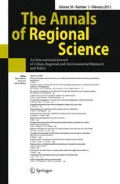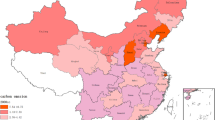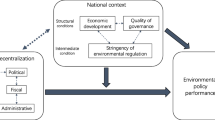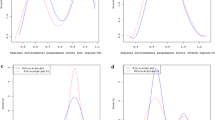Abstract
The purpose of this study is to discuss the direct and indirect effects of fiscal decentralization on environmental governance efficiency (hereafter referred to as EGE). We first put forward hypotheses by using a theoretical framework. Subsequently, we conduct an empirical investigation by using panel data of 30 Chinese provinces over the period 2003–2015. A province-level dataset is used to measure EGE, and new indices are regressed on fiscal decentralization. Results demonstrate that fiscal decentralization has a significant negative effect on EGE and government environmental preference has a mediating effect on the relationship between fiscal decentralization and EGE. The results obtained are robust when different methods are used. A further investigation of heterogeneous responses to policy changes across regions demonstrates that the effect of fiscal decentralization on EGE presents evident regional heterogeneity.


Similar content being viewed by others
Notes
The coastal areas are constituted by 11 regions, including the Beijing, Tianjin, Hebei, Liaoning, Shanghai, Jiangsu, Zhejiang, Fujian, Shandong, Guangdong, and Hainan. The inland areas consist of 19 regions: Shanxi, Inner Mongolia, Jilin, Heilongjiang, Anhui, Jiangxi, Henan, Hubei, Hunan, Guangxi, Chongqing, Sichuan, Guizhou, Yunnan, Shaanxi, Gansu, Qinghai, Ningxia, and Xinjiang.
References
Adam A, Delis MD, Kammas P (2014) Fiscal decentralization and public sector efficiency: evidence from OECD countries. Econ Gov 15(1):17–49
Afonso A, Schuknecht L, Tanzi V (2005) Public sector efficiency: an international comparison. Public Choice 123(3–4):321–347
Akai N, Sakata M (2002) Fiscal decentralization contributes to economic growth: evidence from state-level cross-section data for the United States. J Urban Econ 52(1):93–108
Bahl R, Linn JF (1992) Urban public finance in developing countries. Oxford University Press, New York
Baron RM, Kenny DA (1986) The moderator-mediator variable distinction in social psychological research: conceptual, strategic, and statistical considerations. J Pers Soc Psychol 51(6):1173–1182
Besley T, Case A (1995) Incumbent behavior: vote-seeking, tax-setting, and yardstick competition. Am Econ Rev 85(1):25–45
Besley T, Smart M (2007) Fiscal restraints and voter welfare. J Public Econ 91(3–4):755–773
Blanchard O, Shleifer A (2001) Federalism with and without political centralization: China versus Russia. IMF Staff Pap 48(1):171–179
Chen S (2015) Environmental pollution emissions, regional productivity growth and ecological economic development in China. China Econ Rev 35:171–182
Coelli T, Rao DSP, O’Donnell CC, Battese GE (2005) An introduction to efficiency and productivity analysis. Springer, New York
Davoodi H, Zou HF (1998) Fiscal decentralization and economic growth: a cross-country study. J Urban Econ 43(2):244–257
Du J, Fang H, Jin X (2014) The “growth-first strategy” and the imbalance between consumption and investment in China. China Econ Rev 31:441–458
Ebel RD, Yilmaz S (2002) On the measurement and impact of fiscal decentralization. World Bank, policy research working paper, no. 2809
Elhorst JP (2010) Spatial panel data models. In: Fischer MM, Getis A (eds) Handbook of applied spatial analysis. Springer, New York
Florax RJGM, Folmer H, Rey SJ (2003) Specification searches in spatial econometrics: the relevance of Hendry’s methodology. Reg Sci Urban Econ 33(5):557–579
He Q (2015) Fiscal decentralization and environmental pollution: evidence from Chinese panel data. China Econ Rev 36:86–100
He C, Pan F, Yan Y (2012) Is economic transition harmful to China’s urban environment? Evidence from industrial air pollution in Chinese cities. Urban Stud 49(8):1767–1790
Hendry DF (1979) Predictive failure and econometric modelling in macroeconomics: the transactions demand for money. In: Ormerod P (ed) Economic modelling. Heinemann, London
Hindriks J, Lockwood B (2009) Decentralization and electoral accountability: incentives, separation and voter welfare. Eur J Polit Econ 25(3):385–397
Jin J, Zou H (2005) Fiscal decentralization, revenue and expenditure assignments, and growth in China. J Asian Econ 16(6):1047–1064
Judd CM, Kenny DA (1981) Process analysis: estimating mediation in treatment evaluations. Eval Rev 5(5):602–619
Li H, Zhou LA (2005) Political turnover and economic performance: the incentive role of personnel control in China. J Public Econ 89(9–10):1743–1762
List JA, Gerking S (2000) Regulatory federalism and environmental protection in the United States. J Reg Sci 40:453–471
Liu LL, Ding DH, He J (2019) The welfare effects of fiscal decentralization: a simple model and evidence from China. Qual Quant 53(1):417–434
Mackinnon DP, Warsi G, Dwyer JH (1995) A simulation study of mediated effect measures. Multivar Behav Res 30(3):41–62
Millimet DL (2003) Assessing the empirical impact of environmental federalism. J Reg Sci 43:711–733
Montinola G, Qian Y, Weingast BR (1995) Federalism, Chinese style: the political basis for economic success in China. World Polit 48(1):50–81
Qian Y, Weingast BR (1997) Federalism as a commitment to reserving market incentives. J Econ Perspect 11(40):83–92
Que W, Zhang Y, Liu S, Yang C (2018) The spatial effect of fiscal decentralization and factor market segmentation on environmental pollution. J Clean Prod 184:402–413
Rodríguezpose A, Ezcurra R (2009) Does decentralization matter for regional disparities? a cross-country analysis. J Econ Geogr 10(5):619–644
Shleifer A (1985) A theory of yardstick competition. Rand J Econ 16(3):319–327
Sigman H (2007) Decentralization and environmental quality: an international analysis of water pollution. National Bureau of Economic Research no. 13098
Song Y (2013) Rising Chinese regional income inequality: the role of fiscal decentralization. China Econ Rev 27:294–309
Su FB, Tao R, Lu X, Li M (2012) Local officials’ incentives and China’s economic growth: tournament thesis reexamined and alternative explanatory framework. China World Econ 20(4):1–18
Tanzi V, Schuknecht L (1998) Can small governments secure economic and social well-being? In: Grubel H (ed) How to spend the fiscal dividend: what is the optimal size of government?. Fraser Institute, Vancouver
Tsui K, Wang Y (2004) Between separate stoves and a single menu: fiscal decentralization in China. China Q 177:71–90
West LA, Wong CPW (1995) Fiscal decentralization and growing regional disparities in rural china: some evidence in the provision of social services. Oxf Rev Econ Policy 11(4):70–84
Wu Y, Heerink N (2016) Foreign direct investment, fiscal decentralization and land conflicts in China. China Econ Rev 38:92–107
Wu AM, Wang W (2013) Determinants of expenditure decentralization: evidence from China. World Dev 46(2):176–184
Xie D, Zou H, Davoodi H (1999) Fiscal decentralization and economic growth in the United States. J Urban Econ 45(2):228–239
Xu C (2011) The fundamental institutions of China’s reforms and development. J Econ Lit 49(4):1076–1151
Zhuravskaya E (2000) Incentives to provide local public goods: fiscal federalism, Russian style. J Public Econ 76(3):337–368
Acknowledgements
We notably appreciate the Natural Science Foundation of Jiangsu Province of China (BK20190792) for supporting this study.
Author information
Authors and Affiliations
Corresponding author
Additional information
Publisher's Note
Springer Nature remains neutral with regard to jurisdictional claims in published maps and institutional affiliations.
Rights and permissions
About this article
Cite this article
Zang, J., Liu, L. Fiscal decentralization, government environmental preference, and regional environmental governance efficiency: evidence from China. Ann Reg Sci 65, 439–457 (2020). https://doi.org/10.1007/s00168-020-00989-1
Received:
Accepted:
Published:
Issue Date:
DOI: https://doi.org/10.1007/s00168-020-00989-1




